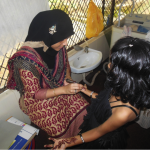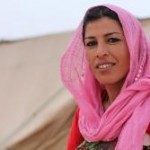This was written by Chally and originally published at Feministe.
Last month, Women Deliver – a fantastic organisation dedicated to improving women’s and girls’ health and wellbeing globally – released the Women Deliver 100. It’s a list of inspiring people, well, delivering for girls and women in all kinds of areas: health, politics, the media, and so on. Out of all those people, there was one I very badly wanted to interview, and her name is Imane Khachani. She’s a twenty-nine year old doctor from Morocco, and she’s one of those people who seem to get as much life and amazing activism into as little time as possible. She was a Special Youth Fellow at the United Nations’ Fund for Population, among other work with the UN, and has collaborated with the Department for Gender, Women and Health at WHO, not to mention Oxfam. Taking a particular interest in HIV/AIDS, she’s worked on sexual and reproductive health programs for young people at home and regionally, and has put together guides for addressing these needs in humanitarian settings. She’s just kind of jaw-droppingly amazing, if you will well know if you caught the video I posted recently.
Well, I was lucky enough to get that interview, thanks to Women Deliver, so here is Imane Khachani.
You are surely one of the busiest and most driven people in the world! How did you come to be a doctor and want to work with sexual and reproductive health and rights?
As a child, I saw myself in a white coat and with a stethoscope like pretty much every kid did at some point but went on from there to aeronautics, law, international politics and even cinema! At 17, in my final year of high school, I came across the biography of Persian physician Ibn Sina, by Gilbert Sinoué, and that was the trigger. Like Adolfo Bioy Casares once said, “The memory a book leaves behind is sometimes more important than the book itself”. I think that book spoke to me in a way no book had ever done before and pictured exactly how I wanted to see myself in the future; dedicating my life to a cause that inspires me while serving others. Of course, the life of a doctor isn’t always a romantic epic tale but despite the difficulty of medical studies and challenges of daily medical practice, especially in resource-limited settings, I think it is the most amazing profession!
My interest in sexual and reproductive health begun during my early Med school years and first hospital rotations, when I realized the huge lack of information and access to basic sexual and reproductive health services for many of our patients, and its dramatic consequences on their health and wellbeing. I witnessed these consequences, often powerless, and knowing that most of them were totally preventable pushed me to “do something”. I volunteered as a reproductive health counselor and as an educational therapy analyst for HIV positive patients and little by little, my clinical work formed a base upon which I could open up to advocacy and public health research. I started with local NGOs, and then joined regional and international sexual and reproductive health and rights networks. Among these, I would give a special mention to the Youth Coalition for Sexual and Reproductive Rights, an entirely youth-led network of activists committed to promoting sexual and reproductive health and rights through advocacy, capacity building and research, of which I am a member since 2005. The Youth Coalition has been and continues to be the most amazing school for me, bridging between medical knowledge, public health research, political analysis and international advocacy.
What’s the situation for women’s health, and status more generally, in Morocco?
In the first decades after Morocco gained independence from French and Spanish rule (1956), women’s rights made some advancements but it was not until 1999, after King Mohammed VI came into power, that women’s rights became a political priority. A historical reform of the Family Code took place in 2004 and granted women more rights in marriage, divorce and custody, recognizing their equal status to men within the family. More recently, Morocco amended the Nationality law, granting the right to Moroccan citizenship to children born to Moroccan mothers from non-Moroccan fathers, and becoming the first country in the Arab region to recognize such right.
Political, economic and social participation of women has also consistently increased in the past few years. Key governmental positions such as the Ministry of Health, Social Development, Energy and Foreign Cooperation are currently headed by women, and more and more women are elected to the Parliament and in local councils.
However, Moroccan women still face many challenges. Low literacy is a major one, as the literacy rate for women remains lower than men and does not exceed 10% in some rural areas. Women have also limited economic opportunities; they count only for 35% of the work force and have a higher unemployment rate than men.
Health sector-wise, primary healthcare is free, but coverage, quality of services and availability of treatments and supplies remain a critical issue, particularly in rural areas. Establishment of user fees for secondary and tertiary level healthcare facilities is a major barrier to accessing specialized healthcare and failure so far to implement a strong public health insurance system, despite the “Assurance Maladie Obligatoire” initiative (“Mandatory Health insurance”) results in the exclusion of a large population – particularly women – from these services. In the area of sexual and reproductive health, the first National Family Planning Program dates back in the early seventies and fertility rates have dramatically decreased ever since, from 7 children born per woman in 1970, down to 2.5 currently. Contraceptive prevalence is one of the highest in the region, reaching 65%. Most primary level reproductive health services and supplies are free, which has contributed to achieving these good reproductive health outcomes. Maternal mortality has also considerably dropped (610/ 100 000 live births in 1996 vs 128/100 000 in 2010), though it remains relatively high compared to the other countries of the region. Major causes include: lack of access to prenatal care (and limited awareness of the importance of prenatal care), unavailability of skilled attendants for deliveries and adequately equipped healthcare facilities, poor post-natal care and unsafe abortion.
You’ve studied and worked all around the world: Morocco, the Netherlands, the United Kingdom, Sweden. How has that added to your vision of what needs to be done for women worldwide?
It’s quite a mix indeed! I was French educated, which clearly influences my way of thinking and analyzing in a very “French Cartesian” way. But studying in different European countries, in a different language (English), and working in North America, the Middle East and Asia have helped me familiarize with different approaches, lines of thoughts and methodologies, shaping up enormously my initial way of approaching things. I have learnt to give up a bit on pure theorizing, though the academic part of me misses it sometimes, and to better bridge the gap between theoretical frameworks and field realities and needs. I am more in an operational research dynamic now and I love the very “action-oriented” aspect of it. Also, one of the most important things I came to realize is the immense diversity of contexts and differing circumstances and the impertinence of one-size-fits-all responses and single-angled visions. The realities, concerns and priorities of women are different in a small village in the Sahel desert or in a suburban neighborhood in Canada and need different responses and different investments, under – of course – the overarching universal human rights’ framework.
Could you tell us about your mission with Médecins du Monde in Pakistan?
Médecins du Monde has been running an emergency mission in the Khyber Pukhtunkhwa province (former North Western Province, close to the Afghan border) for the past five years. It is aimed at providing primary healthcare services to the populations displaced by the ongoing conflict on the border, especially women and children. My mission consisted in analyzing the context and constraints of primary healthcare practice in our mobile clinics, and developing a training curriculum for our staff to improve the quality of services delivered, particularly the health education aspect. I traveled throughout the region, took on some clinical work and put together a primary healthcare training curriculum focusing on the major health issues encountered, and which I then delivered to our staff. It was an absolutely fantastic experience, in all regards. Pakistan is a fascinating country, far more complex than the caricatural terrorism battlefield portrayed by international medias. Pakistani people are quite an intriguing patchwork of cultures, between Pashtuns, Hazaras and Ballochis in the west; and Penjabis and Sindis in the east and south. I absolutely fell in love with the Pashtun culture, music, and tradition of hospitality!
What are the most urgent issues in sexual health and reproductive rights globally at present?
I would say pregnancy and childbirth related mortality and morbidity, which are still SHAMEFULLY HIGH in too many countries. The morbidities are even more problematic, because they are often poorly documented quantitatively and qualitatively, yet much higher and leaving women with life-long disabilities. I think it is time to effectively implement a sexual and reproductive health continuum of care that addresses not only the medical but most importantly the economic, social and cultural determinants of women’s sexual and reproductive health. A continuum that is not focused only on the reproductive period but that starts from childhood (crucial in terms of empowering education and behavior shaping) and that accompanies women throughout their life. Sporadic contraception campaigns or mobile post-partum care units are of course great initiatives but they address only the visible part of the iceberg and fail to tackle the structural factors still causing so many deaths and morbidities.
How important to development are investing in, supporting, and educating girls?
It is crucial. Much has been said on this, and I wouldn’t want to paraphrase or repeat what we all already know. There is a video from the Nike Foundation on that topic called “the Girl effect” that I particularly like (transcript of video available at Feministe):
I think it perfectly summarizes what can be achieved by investing in girls: simply EVERYTHING!











